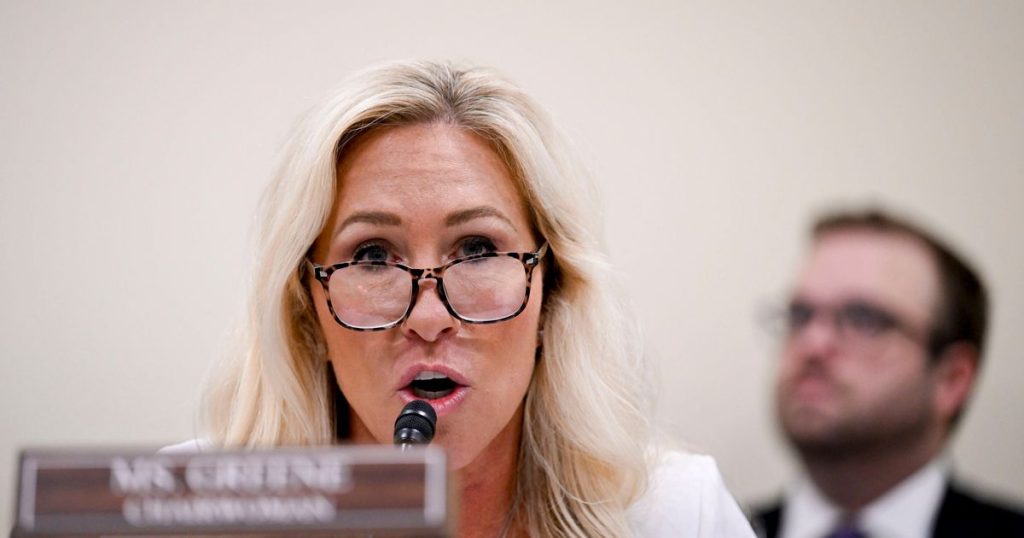The first meeting of the congressional “DOGE” (Department of Government Efficiency) subcommittee took place on Wednesday morning, offering a controversial and revealing look at how Republicans are defending President Donald Trump and Elon Musk’s aggressive efforts to dismantle the federal government. The committee was established as a legislative counterpart to the “Department of Government Efficiency,” a temporary organization created by Trump and led by Elon Musk. This entity has been tasked with overhauling federal agencies, but its methods have raised significant concerns. Musk’s aides have been embedded in various government departments, seeking extensive access to sensitive technology, while the administration has pursued deep budget and personnel cuts without congressional approval. The meeting highlighted the sharp divide between Democrats, who are sounding the alarm over what they describe as illegal actions and a dangerous concentration of power, and Republicans, who are largely avoiding criticism of Trump and Musk’s steadfast campaign to shrink the government.
Rep. Marjorie Taylor Greene (R-Ga.), the chair of the subcommittee, offered some insight into Republican thinking during the hearing. She was responding to concerns raised by Democrats about Trump’s mass firing of 17 inspectors general—internal watchdogs responsible for identifying waste, fraud, and abuse within federal agencies. Democrats argue that these firings are not only illegal but also counterproductive, as inspectors general play a crucial role in holding the government accountable and ensuring taxpayer dollars are spent efficiently. In a particularly bizarre moment, Greene shifted the blame for the federal debt—now totaling $36 trillion—onto the inspectors general themselves. She claimed that Trump had every right to fire them, as they had supposedly overseen the accumulation of such a massive debt. However, this argument ignores the fact that the federal debt is the result of legislative and executive decisions made by Congress and the White House over the years, not the inspectors general.
Democratic members of the committee were quick to push back against Greene’s claims. Rep. Gerry Connolly (D-Va.), the ranking member of the House Oversight Committee, emphasized the importance of independent inspectors general in monitoring government expenditures and rooting out misconduct. He described Trump’s actions as a “wrecking crew” that undermines accountability and transparency. Connolly stressed that Democrats are willing to work with Republicans to address government waste and inefficiency, but they cannot support actions that dismantle the very mechanisms designed to ensure accountability. His comments were echoed by other Democrats, who highlighted the critical role of inspectors general in safeguarding taxpayer funds and upholding the integrity of government operations.
Later in the hearing, Rep. Stephen Lynch (D-Mass.) asked a witness, Dylan Hedtler-Gaudette, the director of government affairs at the Project on Government Oversight, about the consequences of Trump’s mass firings of inspectors general. Hedtler-Gaudette was clear in his assessment, stating that the firings “completely undermine our ability to root out waste, fraud, and abuse.” He explained that inspectors general were established in the wake of the Watergate scandal to serve as independent watchdogs within federal agencies. Their role is to identify and address instances of misconduct or inefficiency, ensuring that government operations are transparent and accountable. By firing these officials, Trump is effectively removing the “cops on the beat” who are tasked with protecting taxpayer dollars and ensuring that government programs operate effectively. Hedtler-Gaudette emphasized that eliminating inspectors general is fundamentally at odds with any stated mission of finding cost savings or rooting out waste.
Separately, Rep. Greg Casar (D-Texas) highlighted another concerning aspect of the firings: the potential conflict of interest involving Elon Musk. Casar pointed out that at least five inspectors general who were investigating Musk’s companies were among those fired by the Trump-Musk administration. This raises serious questions about whether the firings were motivated by a desire to shield Musk’s businesses from scrutiny rather than a genuine effort to improve government efficiency. When Casar raised this issue, Greene repeated her earlier justification, arguing that the massive federal debt justified the firings. However, this response failed to address the conflict of interest concerns or the broader implications of dismantling the inspector general system.
The hearing underscored the deepening partisan divide over Trump and Musk’s efforts to reshape the federal government. While Democrats are sounding the alarm over what they see as a reckless and potentially illegal dismantling of oversight mechanisms, Republicans like Greene are framing the firings as a necessary step to address the federal debt. Despite the lack of evidence linking inspectors general to the creation of debt, Greene and other Republicans continue to use this narrative to defend Trump’s actions. Meanwhile, experts and Democratic lawmakers are warning that the elimination of independent watchdogs will have far-reaching consequences, undermining accountability and paving the way for widespread misconduct. The battle over the future of the federal government—and its system of oversight—has only just begun.









